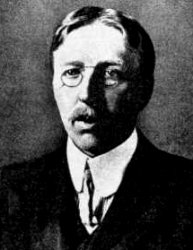Liesl Schillinger, in a review this weekend of Rivka Galchen’s first novel, Atmospheric Disturbances (FSG), mentioned a kindredness between Galchen’s narrator, a psychiatrist named Leo Liebenstein, and “the tormented narrator of Ford Madox Ford’s novel The Good Soldier.” I was glad to see the reference, as I am when anyone mentions Ford’s novel, one very well loved, but no longer widely read.
Of its gestation and execution, Ford said that although he had “written rather desultorily a number of books–a great number,” it was only “on the day I was forty I sat down to show what I could do–and the Good Soldier resulted.” Ford wrote some seventy books in all, and given that only a handful have remained in print, the self-conscious application of effort to which he admitted for The Good Soldier is a rare case of parity between artistic will and aesthetic quality.
Such self-consciousness is appropriate, too, in a novel that attempts a consciousness of the self. For although The Good Soldier is often and to my mind misleadingly classed as an example of the novel of unreliability–in which the story the narrator is telling is at odds with the story the reader is gathering–it is actually a novel whose narrator is highly reliable, and not in the “reliably unreliable” mode.
 John Dowell, the book’s narrator, is telling the story of a period in his life when he and his wife were friends with another couple. If friendships, through time, are tested by the vagaries of life’s divergences and the consistent ways in which we tend to disappoint each other, friendships between couples are complicated further by a compounding of frames of reference and, at times, of conflicting desires.
John Dowell, the book’s narrator, is telling the story of a period in his life when he and his wife were friends with another couple. If friendships, through time, are tested by the vagaries of life’s divergences and the consistent ways in which we tend to disappoint each other, friendships between couples are complicated further by a compounding of frames of reference and, at times, of conflicting desires.
Dowell, telling of the quartet’s tightly-knit time together, a period of many years, is telling two stories, but to my mind he is not deceiving himself. Rather, he is attempting to present the simultaneity of perspectives, false and true, that exist in any social interaction, to the end of showing that few of us can, in lived as opposed to remembered moments, see very far beyond ourselves.
As such, Dowell as narrator is not so much unreliable as he is, very typically, shortsighted. The Good Soldier is not a novel of unreliability but a pageant of shortsightedness, written down in all its little intricacies with unusual completeness and clarity. “Tormented,” in Schillinger’s adjective, is then a most appropriate description of Ford’s narrator, not to say Galchen’s, not to say our own narrations of our lived lives: the world as we believe it to have been is–typically–not quite what we were very sure it was.
































































































